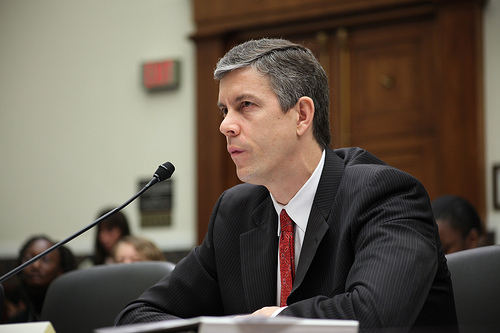Discord amongst state officials and quiet meetings without the state’s top education official may affect South Carolina’s bid for a federal waiver from No Child Left Behind requirements.
At the end of March, South Carolina Superintendent Mickey Zais learned of a meeting between U.S. Secretary of Education Arne Duncan, Rep. Jim Clyburn (D-South Carolina), and representatives of various lobby groups including the South Carolina Association of School Administrators and the South Carolina School Administrators Association. Zais says he was neither informed of nor invited to the meeting.
Zais said he was attending an awards presentation at Scott’s Branch High School when he was informed of the meeting secondhand.
“When I learned of it I went into the meeting that was already underway,” Zais said. “It was certainly a break of protocol and etiquette for Congressman Clyburn to have this meeting and… I think he had coordinated with lobby groups.”
Several school district superintendents who agree with the lobby groups that the state should not implement certain promises it made in its waiver application were also present.
Duncan was not aware Zais had been left off the guest list until the meeting began and requested his presence, said Daren Briscoe, a deputy DOE press secretary.
“It was a meeting that was requested by the SC administrators,” Briscoe said. “They had some concerns about the waiver application and the development of the waiver packet in the state… The important thing was he was there from the outset of the substantive part of the meeting.”
Heart of the Controversy
Several South Carolina district superintendents have expressed disagreement with the state’s plan for receiving a waiver of requirements under the largest federal education law. Duncan has said receiving a waiver from the controversial law’s requirement that all children rate proficient on state tests by 2014 will require states to adopt policy changes the administration approves.
In its waiver request, South Carolina, and nine other states, offered to make changes that include grading all schools in the state from A to F, partly based on how well the school’s students score on state standardized tests.
“That has got a lot of administrators very, very upset because if you have these obscure labels that are not clear, parents don’t really understand whether [students] are attending a failing school or not,” Zais said.
Zais and the state Department of Education held public comment sessions from December 2011 to February 2012 on the state’s waiver, which he says Clyburn and many superintendents did not attend.
“The education lobby is incredibly powerful in South Carolina,” said Barton Swaim, communications manager for South Carolina Policy Council. “That’s why all but the most insignificant school choice bills don’t stand a chance in our legislature.”
Opposition to the state’s waiver application has been mainly isolated to public educators, not the public at large, Swaim said.
“Mick Zais is a popular superintendent,” he said. “That’s especially true the further you get from the education bureaucracy, and [the waiver controversy] won’t hurt him.”
The state’s rejection of Common Core standards, which Duncan heavily favors, has some concerned the application will be discounted on those grounds.
“Quality [state education] standards does not by definition mean adopting Common Core,” Briscoe said. “The decision about whether to grant any particular state a waiver is not a product of a generic calculation of whether a state would benefit from a waiver. It’s whether the state and students of the state would benefit.”
DOE Wants ‘Collaborative Process’
“The ultimate decision whether to grant waivers or not stems from the fidelity of the package to the spirit of the things we’re after,” Briscoe said. “We’re asking states to do in the area of reform as envisioned by that state as designed by that state, we set the high bar and ask them to be creative in how to meet it.”
The U.S. DOE has also asked for states to engage in a “collaborative process” with “all the stakeholders” given a role, Briscoe said.
“You can have a perfect plan but if you don’t have cooperation from stakeholders to implement that plan it can be problematic,” he said.
A mediocre plan improved upon by hard work and collaboration can be a great success, he said.
“The effort across the board has been genuine to do what’s best for kids,” he said. “The challenge is there are different ideas of how to accomplish that sometimes.”
Image by the U.S. Department of Education.




